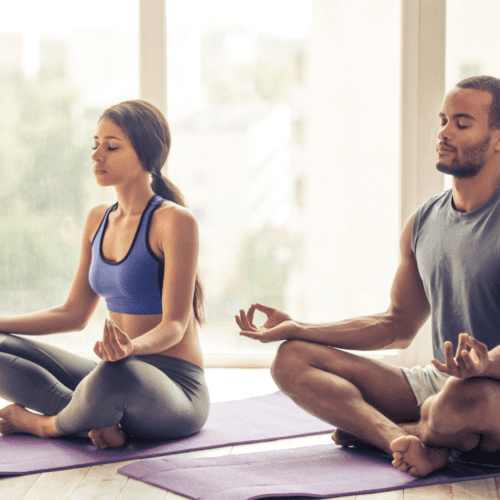I recently met Chrissy Plaugher and was immediately impressed by her depth of knowledge around yoga. When someone can talk about their teachers’ teacher it usually causes my ears to perk up. It reminded me of my own learning journey. Chrissy cares about the art of yoga and is a purist in nature. While she teaches in a way that’s not terribly common in our city, the way she teaches is just yoga. It doesn’t require a fancy adjective and its own category. Her classes involve the elementary basis of yoga with a conscious knowledge of the benefit of centering and breathe.
Chrissy offers a refreshing level of normalcy to yoga. She’s doesn’t walk around with incense and calm facade (or at least not always) but she can explain in depth the etiology of yoga, the exact reason for the practice and why you need it more than just stretching and feeling flexible.
Enjoy her post below– I think you’ll find it very interesting. Feel free to leave a message in the comments section if you’ve seen the positive or the negative impacts of yoga.
The Therapeutic Benefits of Yoga
When I tell people I teach yoga, the conversation usually goes to questions about headstands, crazy poses, and that they wish they could touch their toes. In reality, yoga is less about tying yourself into knots. Instead, it’s more about unknotting the thoughts in your mind, so you can begin to let go of the tension in your neck.
What is Yoga exactly?
According to the 2,000-year text the Yoga Sutra, the quieting of the thoughts in the mind is yoga. When the mind is quiet, we have clarity. Scientists are just starting to study how many thoughts we have. While current research shows we have over 6,000 individual thoughts a day, some researchers believe that the number is really over 50,000. Just thinking about that number can make your brain start to spin!
Why do our thoughts matter?

We are just beginning to understand what yogis have known for thousands of years.
What you think affects your life, how you feel, and even manifests in your physical health.
Living in a fast-paced world that constantly bombards us with new ideas makes it hard to quiet the mind. The overload of information can affect how we feel and how we respond to the world around us.
Our bodies are hardwired to react to stress to protect us from danger, but in our modern society, this hardwiring can manifest itself into high levels of stress, even to a chronic degree.
So, while our bodies may prepare for “fight or flight,” in reality we are simply be worried about feeling unprepared for our 10am meeting.
[check out this blog by Dr. Sarah Crawford to learn more about “fight or flight” to learn more]
As a result, this intense level of chronic stress can cause many health problems for the body.
Effects of Chronic Stress
The Mayo clinic says this type of intense tension puts us at increased risk for many health problems including:
• Anxiety
• Depression
• Digestive problems
• Headaches
• Heart disease
• Sleep problems
• Weight gain
• Memory and concentration impairment
Yoga encourages a slow, conscious breathing.
As we slow the thoughts in the mind by being consciously aware of the breath in the body we work towards letting go of mind-chatter and regaining our focus on being present in the body.
Catherine Woodyard, from the department of Health, Exercise Science and Recreation Management at The University of Mississippi spent some time exploring some of the new research on the therapeutic effects of yoga and its ability to increase quality of life. She states that, “the practice of yoga produces a physiological state opposite to that of the flight-or-fight stress response, and with that interruption in the stress response, a sense of balance and union between the mind and body can be achieved.”
It’s about more than flexibility
It may be true that a regular yoga practice will make you more flexible. You may even gain a deeper sense of body awareness that allows you to stand on your head and float into a backbend with stability and ease. However, I think most practitioners would agree that the ability to live life in a more present state of awareness is the biggest benefit of a regular yoga practice.
With a consistent practice or routine, the common stresses of life are still present, but they do not occupy space in the mind for long, leaving more room for clarity, calm, and time to enjoy what is really important in your life.
About the Author:
Christy Plaugher is an experienced Yoga teacher, focused on the use of the breath along with postures to quiet the mind. She inspires students to find the connection between the mind and body while pursuing a healthy lifestyle. Christy earned her degree at the University of Cincinnati, focusing on Cardiovascular Fitness and Health and has since gone on to own her own Yoga studios, has developed and led teacher training programs, and has been a Dynamic workshop presenter for over 20 years. Christy has received her ERYT 500 certification as well as her RYT 200 certification.


